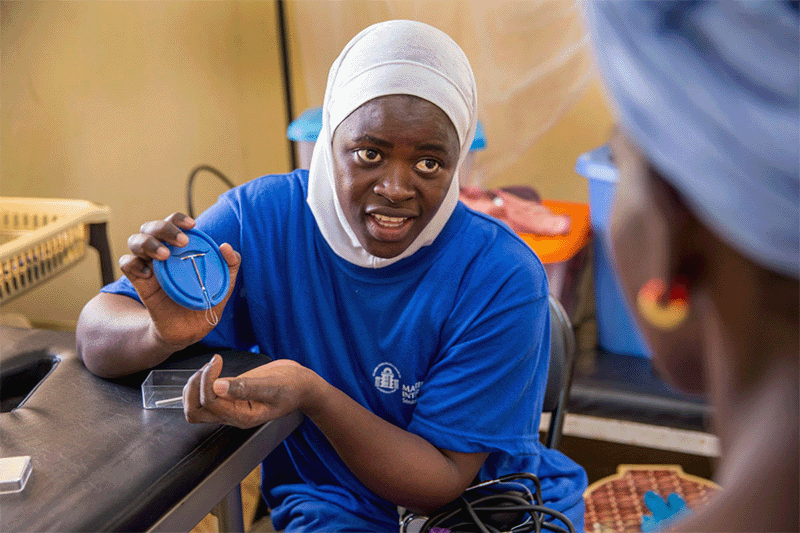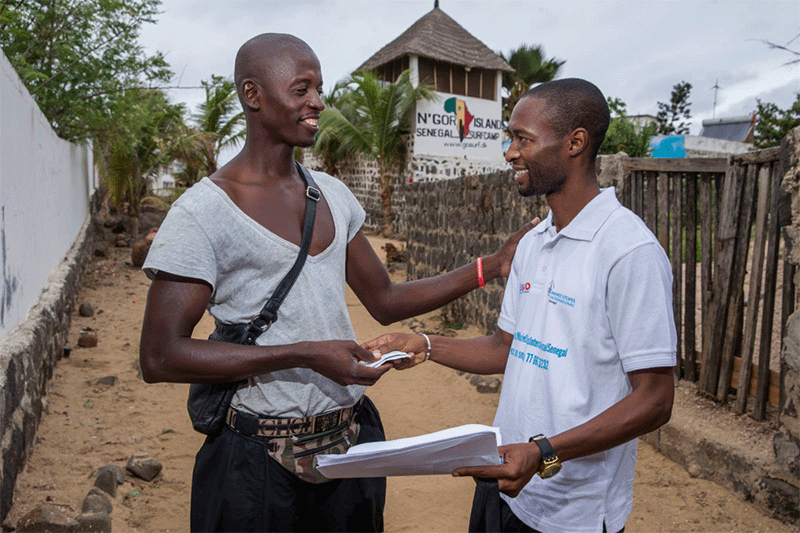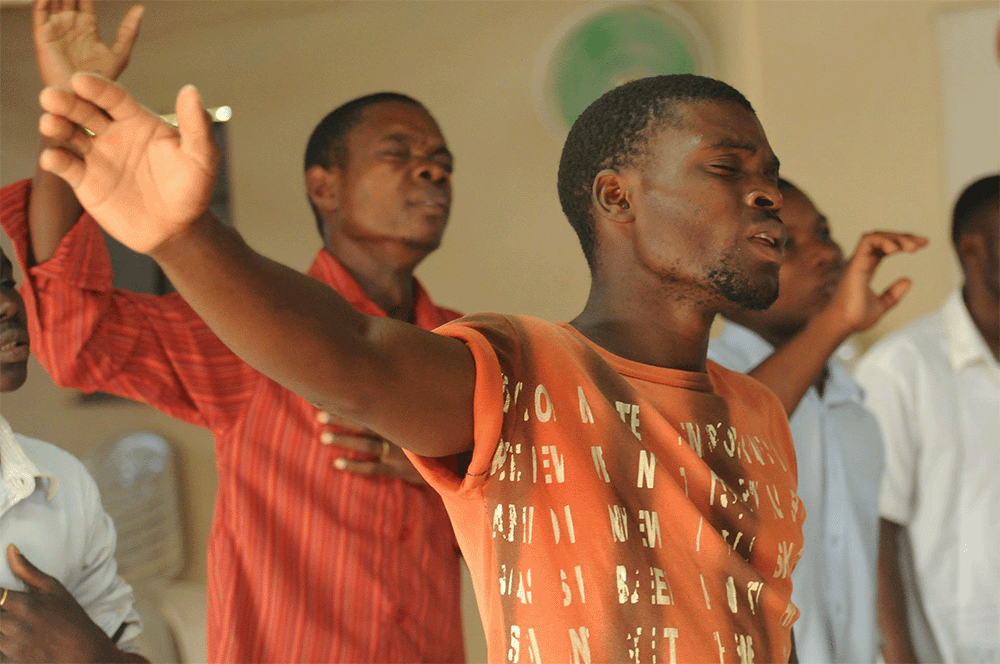In francophone Africa, young people ages 15–24 have difficulty accessing quality family planning (FP) information and services. In addition, they have a higher contraceptive discontinuation rate than older women and are particularly sensitive to adverse effects. In March 2022, Population Reference Bureau (PRB) convened a series of four webinars as a follow-up to the dialogue on sustainable youth contraceptive use initiated in 2021. This webinar series was supported by the U.S. Agency for International Development (USAID)-funded PACE Project, in collaboration with Knowledge SUCCESS.
Population Reference Bureau’s March 2022 webinar series brought together representatives from the Ministries of Health of the Democratic Republic of the Congo (DRC), Guinea, and Mali, youth organizations, religious leaders, and technical and financial partners (TFPs) committed to improving FP access for youth. Panelists discussed sustainable FP access for youth based on a PACE analysis of the policy landscape in the Ouagadougou Partnership (OP) countries. Project-developed communication tools designed to strengthen the evidence-based dialogue on FP for youth supported the discussions.
Summary of Webinar Sessions
Webinar 1: March 8, 2022, Sustaining Youth Contraceptive Use in the Context of FP2030 Commitments
Moderator: Ms. Aissata Fall, Regional Representative for West and Central Africa – PRB
Panelists:
- Ms. Fatou Diop, founding member of FP2030’s consultative group of young civil society organizations, Senegal.
- Dr. Simon Mambo, co-founder/executive director, Youth Alliance for Reproductive Health, the Democratic Republic of the Congo.
- Dr. Siré Camara, head of the Division of Family Planning at the National Directorate of Family Health and Nutrition (DNSFN) at the Ministry of Health and Hygiene, Guinea.
The policy landscape for sustainable youth contraceptive use in the nine OP countries was analyzed based on seven recommendations outlined in a 2021 PRB policy brief. These recommendations aim to ensure that every young person has access, without discrimination, to the contraceptive method of their choice when and where they want it. A review of policy and regulatory documents from different countries, including FP2030 commitments, reproductive health laws, and National Budgeted Family Planning Action Plans, shows that, overall, the broader policy environment remains unsupportive of sustainable youth contraceptive use. Most countries recognize youth as a special-needs group, but affordability, personalized follow-up, and access to the full range of contraceptives—especially self-administered methods—are largely inadequate. Panelists discussed priorities for their respective countries.
In Guinea, insufficient domestic resources, the socio-cultural context, and the lack of youth-friendly services are all obstacles. The availability of a full range of contraceptive products was identified as a key issue and is currently being addressed through a commitment to expand the supply of products in school infirmaries, the private sector, and military garrisons. This dynamic is also based on collaboration with civil society organizations, TFPs, and the active participation of young people.
In Senegal, addressing the diversity of youth needs was identified as a priority, considering their heterogeneity in terms of age, marital status, and living situation. Youth organizations will seize the opportunity offered by the new National Budgeted Family Planning Action Plans to improve access to contraception for unmarried youth, who are ignored in the current documents.

Finally, the Democratic Republic of the Congo (a country outside the OP) is prioritizing easy access to contraception in the private sector. Youth organizations there have conducted data-informed advocacy for the recognition of the specific needs of youth and obtained the signature of the provincial government on a decree supporting a five-year plan for youth access to contraception that emphasizes the importance of client-centered care.
March 14 and 24, 2022: Strengthen Partnerships with Youth and Religious Leaders to Improve Youth Access to Family Planning Through Informed Community Dialogue
Webinar 2: March 14, 2022, Reinforcing Partnerships with Youth and Faith Leaders to Improve Youth’s Access to Family Planning
Moderator: Ms. Célia d’Almeida, communication consultant, director at Odeka Media & Training
Panelists:
- Mr. Aly Kébé, member of the network of youth SRH/FP ambassadors, Mauritania.
- Imam Abdallah Sarr, secretary-general of the Hands of Fraternity Association, Mauritania.
- Dr. Ben Moulaye Idriss, director-general of the National Office of Reproductive Health (ONASR), Mali.
- Dr. Konan Jules Yao, deputy representative, UNFPA, Central African Republic.
Webinar 3: March 24, 2022, Advancing Policy Agendas Through Informed Community Dialogues
Moderator: Ms. Célia d’Almeida, communication consultant, director at Odeka Media & Training
Panelists:
- Ms. Hayathe Ayeva, young leader and SRH/FP ambassador, Togo.
- Ms. Marlène Quenum, president of Hello Benin NGO, head of the coalition of civil society organizations, Benin.
- Cheikh Elh Oumarou Mahaman Bachir, president of the Religious Alliance of West Africa, Niger.
- Mr. Aliou Diop, president of the Association of Managers for Development, FP2030 civil society focal point, Mauritania.
- Dr. Koudaogo Ouédraogo, resident representative, UNFPA, Central African Republic.
The role of religious leaders in demystifying the taboos around FP for youth and reinforcing evidence-informed dialogue is amply demonstrated. Videos produced by the PACE Project in collaboration with religious leaders and youth in the Sahel illustrated the commitment of various religious denominations to promoting youth contraceptive use to ensure the well-being of both mother and child. And while their messages are framed in the context of marriage regardless of country, access to contraception for all youth—including unmarried youth—is included in the policies of secular countries such as Mali and the Central African Republic. In Mali, annual campaigns offer FP services to all users without restriction, in accordance with the principles of non-discrimination—particularly concerning young people—with the support of TFPs.
All panelists recognized the importance of informing FP communication with evidence, such as national Demographic and Health Survey (DHS) and Multiple Indicator Cluster Survey (MICS) data but noted that it remains insufficient to support dialogue and advocacy. Existing data, often quantitative and time-specific, does not provide insight into the dynamics of youth contraceptive use. Secondary analyses of country data can help explain contraceptive discontinuation and convey the impact of side effects to improve messaging for both policymakers and the community. They are also important to demonstrate, for example, the role of FP in reducing maternal and neonatal mortality and early pregnancy rates. Panelists emphasized the need for a governance and coordination framework to more efficiently use data produced by states and TFPs. The TFPs were encouraged to publish the data they produce on their websites for better monitoring of OP and FP2030 commitments.
Webinar 4: March 29, 2022, Reinforcing Community Leaders as Allies for Continued Youth Contraceptive Use
Moderator: Ms. Aissata Fall, regional representative for West and Central Africa, PRB
Panelists:
- Ms. Sorofing Traoré, UCPO/FP2030 youth focal point, Mali.
- Dr. Alice Ndjoka, assistant director, National Reproductive Health Program at the Ministry of Public Health, Hygiene, and Prevention, the Democratic Republic of the Congo.
- Ms. Aminatou Sar, director of West Africa Hub and Senegal Office, PATH.
- Dr. Bwato N’sindi, technical specialist (MH/RHCS), head of Sexual and Reproductive Health Unit, UNFPA, Togo.
During this session, participants discussed policy recommendations regarding the unique needs of youth and the availability of a full range of contraceptives. The panelists (Ministries of Health, youth organizations, and TFPs) shared notable progress, such as approval of the values and sexual health education program in Togo, promotion by DRC authorities of “youth-friendly” spaces in health facilities and the community, and inclusion of youth contraception use in the reproductive health laws of their respective countries (DRC, Mali, Senegal, and Togo). However, this legal context remains insufficient or is subject to sociocultural constraints.
In the DRC, the law limits 15- to 17-year-olds’ choice of contraceptive methods without parental authorization and prohibits access without parental consent for those under 15. In Mali and Togo, prejudice, health care providers’ lack of youth-friendly counseling skills, and the influence of conservative religious leaders are major obstacles. Despite the growing commitment of civil society and religious leaders, sociocultural barriers remain. All agree that no significant improvement in youth access to contraception has been made, underscoring the need to strengthen the recognition and involvement of youth as full-fledged actors in policy and program development.

Conclusions and Recommendations
The policy landscape in OP countries remains unsupportive of sustainable youth contraceptive use. Despite progress in terms of strong commitments and new regulations, young people face multiple challenges in gaining sustainable access to a modern contraceptive method when and where they want it. Restrictions based on age, cost, and provider bias are all obstacles that we must overcome. Given this persistent situation, meaningful youth participation cannot be considered optional. Youth represent the majority of the population and must be fully involved in the formation of policies that affect them and their futures. They must have the necessary knowledge to be heard and to ensure that their specific needs are thoroughly considered. As full-fledged actors in the community, they are the allies of governments. In societies fundamentally guided by faith, religious leaders are a force for strengthening dialogue and debunking false beliefs. Their collaboration with youth to bring about positive change must be supported to amplify relevant evidence-based communication, using messages that are appropriate and shared by all.
Key Resources (click to expand)
The following PACE project resources were shared during the webinar series:
- Best Practices for Sustainable Contraceptive Use Among Youth: This policy brief describes patterns of contraceptive discontinuation among youth and summarizes the evidence on the drivers of discontinuation— namely, method concerns and quality of care. It presents a new analysis of key elements of dissatisfaction with FP services among youth that may contribute to contraceptive discontinuation. It describes policy and programmatic strategies that can improve contraceptive continuation among young women who want to prevent, delay, or space pregnancies.
- Building Community Confidence and Dialogue on Faith, Female Genital Mutilation, and Family Planning—in French (Mauritania): PRB collaborated with the Association des Gestionnaires pour le Développement (AGD) and the Cadre des Religieux pour la Santé et le Développement (CRSD) to convene a multidisciplinary group committed to birth spacing among married couples and the abandonment of the practice of female genital mutilation and cutting (FGM/C) in Mauritania. This multidisciplinary group is made up of representatives from the Ministry of Health, religious leaders, youth, and donors. The group validated the development and production of a video aimed at religious leaders and youth in Mauritania and the Sahel. The video’s purpose is to catalyze regional and national dialogue on the positive intersections between Islam and the reproductive health and wellness needs of Mauritania’s women and youth. It shows possible forms of collaboration between religious leaders and youth to create an enabling environment for youth reproductive health policies and programs.
- Nothing is Taboo! (Sahel Region): This ENGAGE presentation shows how religious communities and youth in the Sahel can work together to advance the future of the region by promoting frank and open dialogue and by prioritizing social tolerance. It highlights how religious leaders can use their influence in a positive way to condemn the practices of child marriage and FGM/C. The presentation also reinforces the message that religious leaders in the region are willing to encourage the use of FP among young married couples and to support family life education programs.
- Senegal is Committed: Religion and Family Health: This presentation is an advocacy tool to link reproductive health and family planning issues to faith-based attitudes and beliefs. Drawing on community and religious leaders, it connects the impacts of family planning and birth spacing to positive outcomes for childcare, nutrition, and education, as well as for natural resources. Furthermore, it illustrates how family planning improves maternal and child health and contributes to the well-being of Senegalese families. By breaking down complex concepts and using non-technical language, the presentation shows how religious leaders in Senegal can guide families to lead spiritual, happy, and healthy lives.
- Policy Landscape for Sustaining Youth Contraceptive Use in the Nine Ouagadougou Partnership Countries—in French: This analysis reviews the implementation status of the policy brief’s seven recommendations throughout the nine OP countries. Each recommendation is broken down into criteria to which indicators are assigned. The review of policy and program documents made it possible to assign a rating to each indicator. The analysis method evaluated the immediate accessibility or lack thereof for young people aged 15 to 24 in need of FP services; the rating for each indicator was, therefore “Yes” or “No.” The objective of the analysis is to provide advocates with information and data from national documents to inform their messages and their discussions with policymakers.





